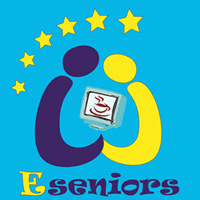E-Seniors is a non-profit non-governmental organization, founded in 2005 by Monique Epstein, the general manager of the association. E-Seniors aims at fighting e-exclusion by offering ICT training to seniors (people aged 55 and over). Its main objectives are:
- to bridge the digital gap between generations,
- to foster seniors’ social participation,
- to propose activities encouraging seniors to spend actively their free time.
Since its creation, E-Seniors provides ICT courses for seniors in various public places and constantly opens new courses all over the Parisian region, in order to provide proximity services taking into account the rhythm, the interests and the needs of its audience. Through its actions for and with elderly people, E-Seniors also raises awareness about the importance of ICT solutions in everyday life. The association also proposes interactive gaming activities in elderly residences, retirement homes and day-care centres. E-Seniors is aware of the challenges that both healthy and dependant seniors face up to and is involved in the development of new products and services aiming to boost independent living and to maintain physical and mental health.
E-Seniors has a large experience in the management of projects related to ICT tools and healthy ageing financed by European programs, such as Horizon 2020 and Erasmus+:
- The ICT4Life project (H2020-PHC25) creates an online platform that links all the stakeholders involved in healthcare related to Alzheimer’s and Parkinson’s diseases.
- The MindSpaces project (H2020-ICT32-2018) aims to create a novel approach to urban and architectural design by generating 3D-VR immersive and emotion-adapted “neuro-environments” that will help in designing emotionally-relevant urban spaces.
- The EMPATHIC project (H2020-SC1-PM-15-2017) creates a virtual coach that promotes healthy habits and behaviour by challenging each user to transform their personal goals and needs into actions, and that helps elderly people to live independently.
- Several Erasmus+ projects: RESET, European Adults, PAST-TIMES, Escape, IAMHC, ProADAS, Click Clever, IDP Living, MORE, Intergenerational Cooperation Support, Sparkling Grey, Sharing Economy for Active Ageing and By Forest Education.
ESE is an associated partner of the French node of the EIT Health KIC (Knowledge and Innovation Community), a European consortium operating in the framework of the European Institute of Innovation and Technology (EIT). One of the objectives of the KIC is to promote innovation in healthy living and active ageing. E-Seniors is involved in several projects financed by the EIT Health, such as SweetDreams, Chronos, Citizens Act, ExCEL Network, CARE, Citizens Health Data, MoveAGE, Healthy Lonliness, CCenter and EHI-ICTT. E-Seniors is also partner of the EIT Food KIC.
Involvement in European projects
E-Seniors, as an end-users representative organisation, undertakes specific roles during the whole duration of the projects:
- In the Work Packages (WP) relating to needs analysis (users’ requirements) – first stages of the project:
- Identifying target user groups
- Analyzing users’ needs (by using specific methods of social sciences such as interviews and focus groups) and users’ requirements: usability and accessibility issues
- Designing scenarios and use cases
- Defining tests characteristics (protocol of the pilot phase) in terms of users and project objectives
- In the technical WPs – in the stage of the solution development:
- Linking developers and target groups by submitting the first technical developments to the users in order to develop an operational prototype taking into account their opinions and comments (iterative testing)
- Translating and adapting the content
- In the WPs tests and pilots – after the elaboration of a solution ready for testing:
- Recruiting users according to the main criteria identified in the WP needs analysis
- Carrying out tests in agreement with French and European laws (make sure that there is an informed and voluntary consent from the tests participants and that the tests have been declared to competent authorities)
- Validating pilot application and prototype interfaces
- Gathering conclusions from users’ feedback in order to make recommendations improving product design
- During the whole project (together with all the partners):
- Addressing ethical issues: informing and ensuring the proper functioning of processes – together with other user groups (if they exist)
- Disseminating information about the project through our usual communication channels: newsletters, social networks, website, events …
- Provide our expertise on the French market during the drafting of deliverables about solutions exploitation
